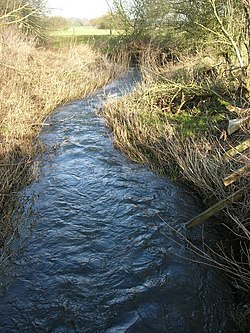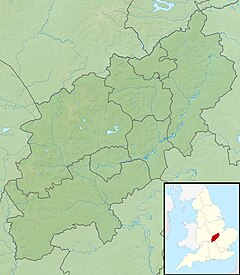| This article needs additional citations for verification. Please help improve this article by adding citations to reliable sources. Unsourced material may be challenged and removed. Find sources: "River Tove" – news · newspapers · books · scholar · JSTOR (May 2008) (Learn how and when to remove this message) |
| Tove | |
|---|---|
 The River Tove at Abthorpe, Northamptonshire. The River Tove at Abthorpe, Northamptonshire. | |
 | |
| Location | |
| Sovereign State | United Kingdom |
| Country | England |
| County | Northamptonshire |
| Physical characteristics | |
| Source | |
| • location | Greatworth, Northamptonshire |
| • coordinates | 52°05′30″N 1°11′49″W / 52.091560°N 1.1970709°W / 52.091560; -1.1970709 |
| • elevation | 165 m (541 ft) |
| Mouth | River Great Ouse |
| • location | Cosgrove, Northamptonshire |
| • coordinates | 52°04′19″N 0°49′54″W / 52.071924°N 0.831661°W / 52.071924; -0.831661 |
| • elevation | 63 m (207 ft) |
| Basin size | 216 km (83 sq mi) |
| Basin features | |
| River system | River Great Ouse |
The River Tove is a river in England, a tributary of the River Great Ouse. Rising in Northamptonshire about a mile north of Greatworth, it flows for about 15 miles (24 km) north and east of the town of Towcester (meaning 'camp on the Tove') near Bury Mount before meeting the Ouse south-east of Cosgrove just north of Milton Keynes. Its final 5 miles (8 km) form part of the border between Northamptonshire and Buckinghamshire, running alongside the Grand Union Canal. The river ultimately flows into the North Sea.
Etymology
The Old English name of Towcester, which is named for the River Tove, is Tófe-ceaster, suggesting (since ceaster comes from the Latin castra, meaning "camp") that the Old English name for the Tove was some form of Tófe. Bosworth and Toller give the "Scandinavian proper names" Tófi and Tófa for comparison.
It is thought Tófa is a shortened form of Thorfrithr, meaning "beautiful Thor" or "peace of Thor."
However, the clearest link for an older origin of the Tove name can be found in the dedication on the Sønder Vissing Runestone. The 10th century carvings describe the stone as having been raised by Tófa, in memory of her mother. The first character of her name is ᛏ, the Rune for Týr, a Northern European deity thought to be of early origins in an Indo-European Pantheon. He was a sky god, god of justice, sacrifice and war.
References
- Flavell Edmunds. "Towcester." Traces of History in the Names of Places. London: Longmans, Green, and Co., 1869. 272.
- ^ Joseph Bosworth and T. Northcote Toller, "Tófe-ceaster." An Anglo-Saxon Dictionary. Oxford: Oxford UP, 1882. 997. (Online version)
- "Chester." Oxford English Dictionary. oed.com
- names-meanings.net: Tofa
- behindthename.com: Tove, Thorfrithr
- Teresa Norman, "Tova." A World of Baby Names. New York: Penguin, 2003. 504.
| Non-tributaries | |
|---|---|
| Tributaries | |
| Passing Denham/Iver |
|
| Man-made | |
52°07′45″N 0°57′03″W / 52.12917°N 0.95083°W / 52.12917; -0.95083
This Northamptonshire location article is a stub. You can help Misplaced Pages by expanding it. |
This Buckinghamshire location article is a stub. You can help Misplaced Pages by expanding it. |
This article related to a river in England is a stub. You can help Misplaced Pages by expanding it. |